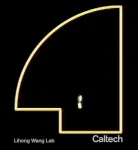(Press-News.org) Philadelphia, January 13, 2021--Researchers at Children's Hospital of Philadelphia and the School of Engineering and Applied Science at the University of Pennsylvania have identified ionizable lipid nanoparticles that could be used to deliver mRNA as part of fetal therapy. The proof-of-concept study, published today in Science Advances, engineered and screened a number of lipid nanoparticle formulations for targeting mouse fetal organs and has laid the groundwork for testing potential therapies to treat genetic diseases before birth.
"This is an important first step in identifying nonviral mediated approaches for delivering cutting-edge therapies before birth," said co-senior author William H. Peranteau, MD, an attending surgeon in the Division of General, Thoracic and Fetal Surgery and the Adzick-McCausland Distinguished Chair in Fetal and Pediatric Surgery at CHOP. "These lipid nanoparticles may provide a platform for in utero mRNA delivery, which would be used in therapies like fetal protein replacement and gene editing."
Michael J. Mitchell, Skirkanich Assistant Professor of Innovation in Penn Engineering's Department of Bioengineering, is the other co-senior author of the study.
Recent advances in DNA sequencing technology and prenatal diagnostics have made it possible to diagnose many genetic diseases before birth. Some of these diseases are treated by protein or enzyme replacement therapies after birth, but by then, some of the damaging effects of the disease have taken hold. Thus, applying therapies while the patient is still in the womb has the potential to be more effective for some conditions. The small fetal size allows for maximal therapeutic dosing, and the immature fetal immune system may be more tolerant of replacement therapy.
Of the potential vehicles for introducing therapeutic protein replacement, mRNA is distinct from other nucleic acids, such as DNA, because it does not need to enter the nucleus and can use the body's own machinery to produce the desired proteins. Currently, the common methods of nucleic acid delivery include viral vectors and nonviral approaches. Although viral vectors may be well-suited to gene therapy, they come with the potential risk of unwanted integration of the transgene or parts of the viral vector in the recipient genome. Thus, there is an important need to develop safe and effective nonviral nucleic acid delivery technologies to treat prenatal diseases.
In order to identify potential nonviral delivery systems for therapeutic mRNA, the researchers engineered a library of lipid nanoparticles, small particles less than 100 nanometers in size that effectively enter cells in mouse fetal recipients. Each lipid nanoparticle formulation was used to encapsulate mRNA, which was administered to mouse fetuses. The researchers found that several of the lipid nanoparticles enabled functional mRNA delivery to fetal livers and that some of those lipid nanoparticles also delivered mRNA to the fetal lungs and intestines. They also assessed the lipid nanoparticles for toxicity and found them to be as safe or safer than existing formulations.
Having identified the lipid nanoparticles that were able to accumulate within fetal livers, lungs, and intestines with the highest efficiency and safety, the researchers also tested therapeutic potential of those designs by using them to deliver erythropoietin (EPO) mRNA, as the EPO protein is easily trackable. They found that EPO mRNA delivery to liver cells in mouse fetuses resulted in elevated levels of EPO protein in the fetal circulation, providing a model for protein replacement therapy via the liver using these lipid nanoparticles.
"A central challenge in the field of gene therapy is the delivery of nucleic acids to target cells and tissues, without causing side effects in healthy tissue. This is difficult to achieve in adult animals and humans, which have been studied extensively. Much less is known in terms of what is required to achieve in utero nucleic acid delivery," said Mitchell. "We are very excited by the initial results of our lipid nanoparticle technology to deliver mRNA in utero in safe and effective manner, which could open new avenues for lipid nanoparticles and mRNA therapeutics to treat diseases before birth."
INFORMATION:
Riley RS, Kashyap MV, Billingsley MM, White B, Alameh MG, Bose SK, Zoltick PW, Li H, Zhang R, Cheng AY, Weissman D, Peranteau WH, Mitchell MJ. "Ionizable Lipid Nanoparticles for In Utero mRNA Delivery," Science Advances, online January 13, 2021, DOI: 10.1126/sciadv.aba1028
About Children's Hospital of Philadelphia: Children's Hospital of Philadelphia was founded in 1855 as the nation's first pediatric hospital. Through its long-standing commitment to providing exceptional patient care, training new generations of pediatric healthcare professionals, and pioneering major research initiatives, Children's Hospital has fostered many discoveries that have benefited children worldwide. Its pediatric research program is among the largest in the country. In addition, its unique family-centered care and public service programs have brought the 595-bed hospital recognition as a leading advocate for children and adolescents. For more information, visit http://www.chop.edu
PHILADELPHIA -- (Jan. 13, 2021) -- Scientists at The Wistar Institute discovered that Early Growth Response 1 (EGR1), a protein that turns on and off specific genes during blood cell development, inhibits expression of pro-inflammatory genes in macrophages. As part of their function to protect the body against pathogens, macrophages play a major role in initiation, maintenance, and resolution of inflammation. The discovery expands the understanding of how macrophages are set off and deactivated in the inflammatory process, which is critical in many normal and pathological conditions. These findings were published online in the journal Science Advances.
"By deepening the understanding of the role of EGR1, we ...
COLUMBUS, Ohio - While we wait for our turn to get vaccinated against SARS-CoV-2, we could - and probably should - use the time to make sure we bring our healthiest emotional and physical selves to the treatment, a new review of previous research suggests.
Ohio State University researchers reviewed 49 vaccine studies in humans dating back 30 years that document how stress, depression and poor health behaviors can negatively affect the body's immune response to vaccination, and how improving health factors can enhance that response.
The impaired immune responses tended to fall into three categories - interference with the ...
Skoltech researchers have found a way to use chemical sensors and computer vision to determine when grilled chicken is cooked just right. These tools can help restaurants monitor and automate cooking processes in their kitchens, and perhaps one day even end up in your 'smart' oven. The paper detailing this research results, supported by a Russian Science Foundation grant, was published in the journal Food Chemistry.
How do you tell that chicken breast on your grill is ready for your plate? You probably look at it closely and smell it to make sure it is done the way you like it. However, if you are a restaurant chef or head cook at a huge industrial ...
Scientists tame photon-magnon interaction.
Working with theorists in the University of Chicago's Pritzker School of Molecular Engineering, researchers in the U.S. Department of Energy's (DOE) Argonne National Laboratory have achieved a scientific control that is a first of its kind. They demonstrated a novel approach that allows real-time control of the interactions between microwave photons and magnons, potentially leading to advances in electronic devices and quantum signal processing.
Microwave photons are elementary particles forming the electromagnetic waves that we use for wireless communications. On the other hand, magnons are the elementary particles forming what scientists call "spin waves" -- wave-like disturbances in ...
In a study in mice and human cells, Johns Hopkins Medicine researchers say that they have developed a tiny, yet effective method for preventing premature birth. The vaginally-delivered treatment contains nanosized (billionth of a meter) particles of drugs that easily penetrate the vaginal wall to reach the uterine muscles and prevent them from contracting. If proven effective in humans, the treatment could be one of the only clinical options available to prevent preterm labor. The FDA has recommended removing Makena (17-hydroxyprogesterone caproate), the only approved medicine for this purpose, from the market.
The study was published Jan. 13 in Science Translational Medicine.
There ...
A group of scientists led by the American Museum of Natural History and Bat Conservation International have discovered a new species of a striking orange and black bat in a mountain range in West Africa. The species, which the researchers expect is likely critically endangered, underscores the importance of sub-Saharan "sky islands" to bat diversity. The species is described today in the journal American Museum Novitates.
"In an age of extinction, a discovery like this offers a glimmer of hope," said Winifred Frick, chief scientist at Bat Conservation International and ...
With the impact of climate change increasing by the day, scientists are studying the ways in which human behavior contributes to the damage. A recent study at Walla Walla University, by a collaboration of researchers from Walla Walla University and La Sierra University, examined the effects of acidic water on octopuses, potentially bringing new insight into both how our activities impact the world around us, and the way that world is adapting in response.
The study, "Impact of Short- and Long-Term Exposure to Elevated Seawater PCO2 on Metabolic Rate ...
The human organism requires a variety of small molecules, such as sugars or fats, in order to function properly. The composition of these so-called metabolites and their interaction - the metabolism - varies from person to person and is dependent not only on external influences, such as nutrition, but also to a significant extent on natural variations in our genetic make-up. In an international study, scientists from the Berlin Institute of Health (BIH) and Charité - Universitätsmedizin Berlin joined forces with colleagues from the United Kingdom, Australia and the United States and discovered hundreds ...
A new study from UBC researchers suggests a strong correlation between following the MIND and Mediterranean diets and later onset of Parkinson's disease (PD). While researchers have long known of neuroprotective effects of the MIND diet for diseases like Alzheimer's and dementia, this study is the first to suggest a link between this diet and brain health for Parkinson's disease (PD).
The MIND diet combines aspects of two very popular diets, the Mediterranean diet and the Dietary Approaches to Stop Hypertension (DASH) diet.
"The study shows individuals with Parkinson's disease have a significantly later age of onset if their eating pattern closely aligns with the Mediterranean-type diet. The difference shown in the study was up to 17 years later in women and eight years later ...
There are things in life that can be predicted reasonably well. The tides rise and fall. The moon waxes and wanes. A billiard ball bounces around a table according to orderly geometry.
And then there are things that defy easy prediction: The hurricane that changes direction without warning. The splashing of water in a fountain. The graceful disorder of branches growing from a tree.
These phenomena and others like them can be described as chaotic systems, and are notable for exhibiting behavior that is predictable at first, but grows increasingly random with time.
Because of the large role that chaotic systems play in the world around us, scientists and mathematicians have long sought to better understand them. Now, Caltech's Lihong Wang, the Bren Professor in the Andrew and ...





